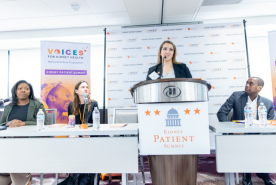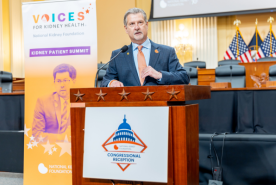May 28, 2020
By Kevin Longino, CEO of National Kidney Foundation and kidney transplant patient
You’ve been reading in my blogs about how COVID-19 is causing acute kidney injury in people with no history of kidney disease, and the devastating toll the virus takes on kidney patients, especially transplant patients. But COVID-19 is unduly devastating to minority communities and NKF has been working to put a spotlight on it to drive change.
Finding answers
Yesterday, along with the NAACP, NKF hosted a briefing for Congressional staff on Kidneys and COVID-19: Navigating Health Disparities in Minority Communities. A distinguished panel of experts discussed some of the reasons why minority communities are so disproportionately affected by coronavirus and outlined what we can do to help address these challenges.
First, the facts on minority communities and kidney disease: African Americans are 13% of the U.S. population, but represent 32% of those with kidney failure. Hispanics and Native Americans are two times as likely as Caucasians to develop kidney failure. The two main causes of kidney disease are diabetes and high blood pressure, which are more prevalent in African American and Hispanic communities. People facing housing insecurity are three times more likely to develop early kidney disease. Low income individuals are twice as likely as high income individuals to develop kidney failure.
What about the risks related to COVID-19?
During her presentation, Francesca Weaks, Policy and Research Manager at the NAACP discussed that in some states African Americans are six to seven times more likely to die from COVID-19 than white residents. In states like Missouri and Michigan, the disparity between the percent of population African Americans represent versus the percent of those diagnosed with COVID-19 is nearly 30%. Nationwide, African Americans represent 12.9% of the population, but have suffered 25.1% of deaths – roughly double their population share, among all American deaths where race and ethnicity is known.
What can we do?
Dr. Deidra Crews, Associate Professor of Medicine, Division of Nephrology, and Associate Director for Research Development, Johns Hopkins Center for Health Equity offered some possible reasons for the alarming impact on minority communities such as a lack of access to basic resources including food, water, shelter, and transportation; suboptimal housing conditions; employment in essential jobs with limited protections; lack of access to healthcare services; mistrust of institutions due to discriminatory experiences.
While this is a complex issue, there are some specific strategies NKF is advocating for right now to help. We’re urging the federal government to provide quality, disaggregated data on all tests, hospitalizations, discharges and deaths from COVID-19 so we fully understand the scope of the problem; ensure priority testing, contact tracing, vaccination, and funding to high-risk and minority communities and kidney patients; support long-term investments in public health infrastructure in traditionally under-served communities; and increase funding for kidney research and awareness. While we don’t have all the answers, we’re determined to help find some of the solutions.
Ask questions live today
If you’re interested in learning more about how COVID-19 is affecting minority communities, NKF is also hosting a Q&A webinar/Facebook Live today at 3:00PM ET. Ask questions live as an expert panel discusses the latest updates on the COVID-19 virus and how it is affecting African American and Hispanic communities, including are there genetic or other factors that make minority communities more susceptible to the virus; and what you can do to protect yourself.
Final thoughts
COVID-19 has brought so many challenging issues to the forefront, and the issue of health disparities facing minority communities is one of the most difficult. And COVID-19 now intersects with kidney disease as disproportionately affecting those same communities. For my part, I will continue to steer NKF towards a long-term and focused outreach to communities at risk for developing kidney disease and the devastating complications which accompany it. This is just the beginning; I hope you’ll join me on the journey.
Please continue to check our COVID-19 resource page where we post all the latest information on issues facing our community in English and in Spanish. If you have questions or need support, please contact our toll free patient information help line by calling (855) NKF-CARES, (1-855-653-2273) or by email nkfcares@kidney.org. And join our free online discussion forums.
Be well and stay safe.


















